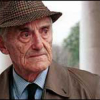Patrick O'Brian

Patrick O'Brian
Patrick O'Brian, CBE, born Richard Patrick Russ, was an English novelist and translator, best known for his Aubrey–Maturin series, a series of sea novels set in the Royal Navy during the Napoleonic Wars and centred on the friendship of English naval captain Jack Aubrey and the Irish–Catalan physician Stephen Maturin. The 20-novel series, the first of which is Master and Commander, is known for its well-researched and highly detailed portrayal of early 19th-century life, as well as its authentic and...
NationalityEnglish
ProfessionNovelist
Date of Birth12 December 1914
A freewheeling mind can conceive a virtually infinite number of sequences, but just how that mind picks out and stores those that may perhaps be used later to deal with a given tension, a given situation, is far beyond my understanding.
Why, sir," said he, looking about him, "what splendour I see: gold lace, breeches, cocked hats. Allow me to recommend a sandwich. And would you be contemplating an attack, at all?" "It had crossed my mind, I must admit," said Jack. "Indeed, I may go so far as to say, that I am afraid a conflict is now virtually inevitable. Did you notice we have cleared for action?
Never mind manoeuvres, always go at them.
Sir,’ said Stephen, ‘I read novels with the utmost pertinacity. I look upon them--I look upon good novels--as a very valuable part of literature, conveying more exact and finely-distinguished knowledge of the human heart and mind than almost any other, with greater breadth and depth and fewer constraints.
I've never set out to seduce my reader. I don't see him at all clearly.
About my books, that's all that I think the public has, in its normal way, to know. My private life is, by definition, private.
The first interviews I gave were entirely unpleasant. You have people trying to trip you up with impolite questions that have nothing to do with the books. It's simply vulgar curiosity, and I won't have it.
Since I grew up, I have never deliberately used any technique at all other than the physical shaping of my tale so that it more or less resembles what has been thought of as a novel for these last two hundred years.
In my case, I write in the past because I'm not really part of the present. I have nothing valid to say about anything current, though I have something to say about what existed then.
Take a newspaper account of Waterloo or Trafalgar, with all the small advertisements: it seems much more real than reading about it in a history book.
The function of the novel is the exploration of the human condition. Really, that's what it's all about.
I have never written for an audience. On the other hand I do not write merely to please myself.
I very much dislike being interviewed by the kind of journalist who tries to dig into your private life.
You can't be happy if you're not tolerably happy with yourself. The addition of friends adds immeasurably to life.